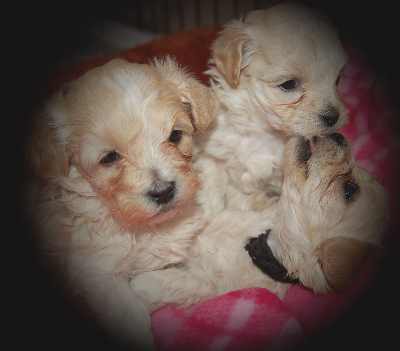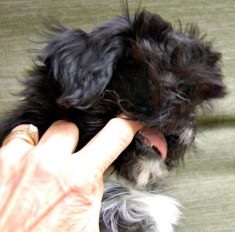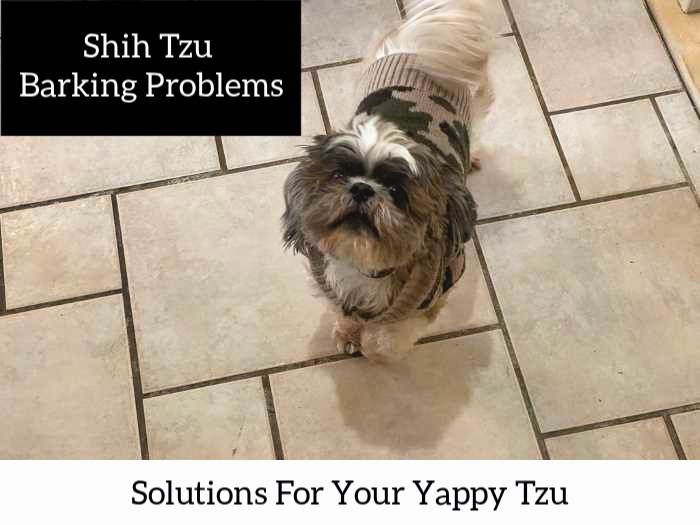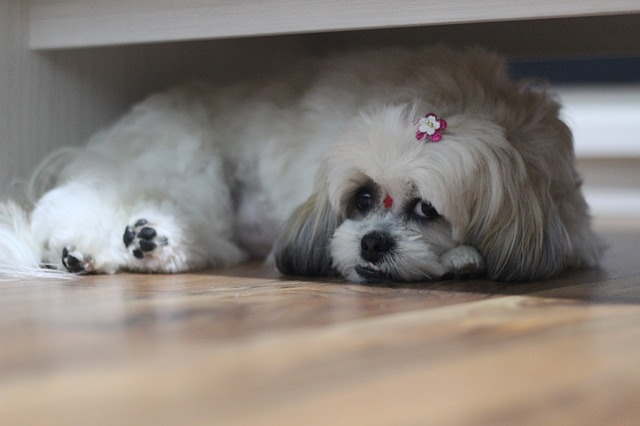How to Stop Puppy Mouthing in Young and Older Puppies
Puppy Mouthing by Janice Jones |Last Updated 02-13-2020
Puppy mouthing, biting, nipping, whatever you want to call it, is a normal behavior of dogs when they are very young.
The number one way that they learn about their world is through their mouth.
Just like human babies, the goal is exploration and they are not acting aggressively.
When a puppy is born, his sense of smell is active allowing him to find his mother and nurse.
As the puppy grows, they use their mouth when they explore their surroundings and play with litter mates.
They play fight, nip and get nipped as they learn. At first their mouthing is simply mouthing, that is, of course, until their little teeth erupt like tiny pointed knives. These first baby teeth are needed to tear into their first puppy kibble. But, what is likely unknown to them is how sharp they are and how much pain they can inflict on their siblings, mama and their favorite humans. They learn quickly by the responses they receive from their siblings, yelps of pain, their mother, through growls and nips from her and of course, through the humans who they have learned control all the good things in life: food.
Their sharp baby teeth can hurt, so gradually they learn through this give and take to adjust their bite so it is not too hard.
Learning to gently mouth another dog is a significant step for a young puppy. After inflicting pain on another and being the victim of pain themselves from those tiny teeth, a young puppy learns to adjust their bite or avoid it all together.
But they may not master this skill entirely by eight weeks of age when most puppies leave their mother and siblings for their forever home. Now they depend on their new human family for this type of play.
It may be perfectly acceptable for puppies to mouth and nip at other puppies, but not when they do it to people. We must teach them that our skin cannot be a play toy. Hopefully, much of this learning has already taken place before the puppy leaves the first secure environment that they have known for the first 8 or 9 weeks of their life. But, what if they were not given any instructions? Perhaps those first lessons didn't didn't make sense or were not learned completely?
There is a big difference between an 8-week old puppy that is unaware of what he is doing when he mouths you and a 7-month-old pup mouthing (aka biting) you for attention! We can forgive an 8 week-old puppy, knowing that this is just a developmental stage where a bit of human interaction will halt the behavior in its tracts.
But, if it continues, that same human that was tolerant of a very young puppies mouthing will become rather annoyed when that puppy, now at 4 or 5 months old starts to bite. To prevent a five month old puppy from biting, it is very important that we nip the problem in the but (no pun intended) when that pup is 8 or 9 weeks. old.
One of the first lessons a very young puppy must learn and master is that human skin is delicate and not to be chewed upon. Most puppies make the connection very early on that biting the hands that provide food is not a smart thing to do. But not all puppies learn this crucial lesson.
Most mouthing occurs when you pick up your puppy and cuddle her. Your hands become her toy. Think about it. Your hands are soft, warm and make a great cushion to sore gums trying to recuperate from teething pain. As humans, our job is to teach the puppy that our hands should never be used as a substitute for a puppy toy.
First Steps at Teaching a Puppy that Mouthing is Never Acceptable
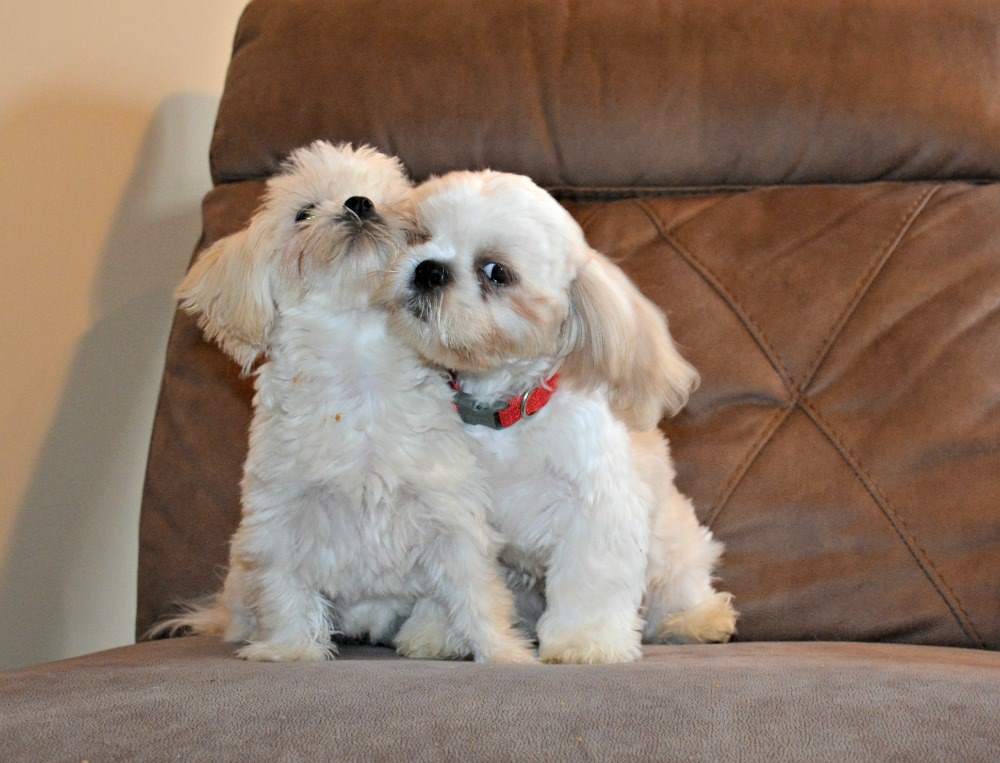 Puppy Mouthing
Puppy MouthingIt may be very innocent at first. When I see a puppy trying to mouth, bite or nibble on a person, I always try to discourage it. Many people, however don't mind the little nips and inadvertently encourage the behavior.
"Oh, it's OK, he's not hurting me."
"I'm OK, he's fine"
These reactions by well-meaning puppy owners are actually encouraging the behavior of mouthing, nipping and eventually biting. A puppy may not hurt a human initially, but they will eventually if the biting tendency is not stopped early on. Teaching a puppy not to mouth a human is much easier than trying to teach an older puppy or adult dog not to bite.
Puppy Mouthing Versus Biting
When a young puppy uses his mouth in play with a human, he is simply doing what comes naturally to him. The first form of canine social play involves mouthing their siblings. Normally this occurs before the initial eruption of the first set of teeth. Just like babies, they are exploring their environment through the use of their mouth. As their teeth begin to emerge, the play becomes more rigorous and puppies begin to understand that they can inflict pain upon their siblings and eventually the humans who care for them.
Dogs are social animals and strive to live harmoniously with others within their pack. They are not hard-wired to hurt those they live with so eventually learn acceptable ways of getting along. Every puppy must learn these lessons, but some learn them faster than others. Some also require human intervention if the lessons were not mastered before they left their original pack.
Teaching Your Puppy That You're Not a Toy
To avoid having your hand (body) considered a toy, there are ways to teach her that puppy mouthing is not acceptable. This is gentle training/socialization that should occur at the time you bring your puppy home. Never allow your puppy to bite or chew on your hand as part of a play session.
It may not hurt you, but your young child may not appreciate the sharp nips that an exuberant puppy may inflict. So, not only should you discourage these bites, but you will also want to teach your children not to allow their new puppy to bite them as well.
Initial Lessons When Interact With Your Puppy
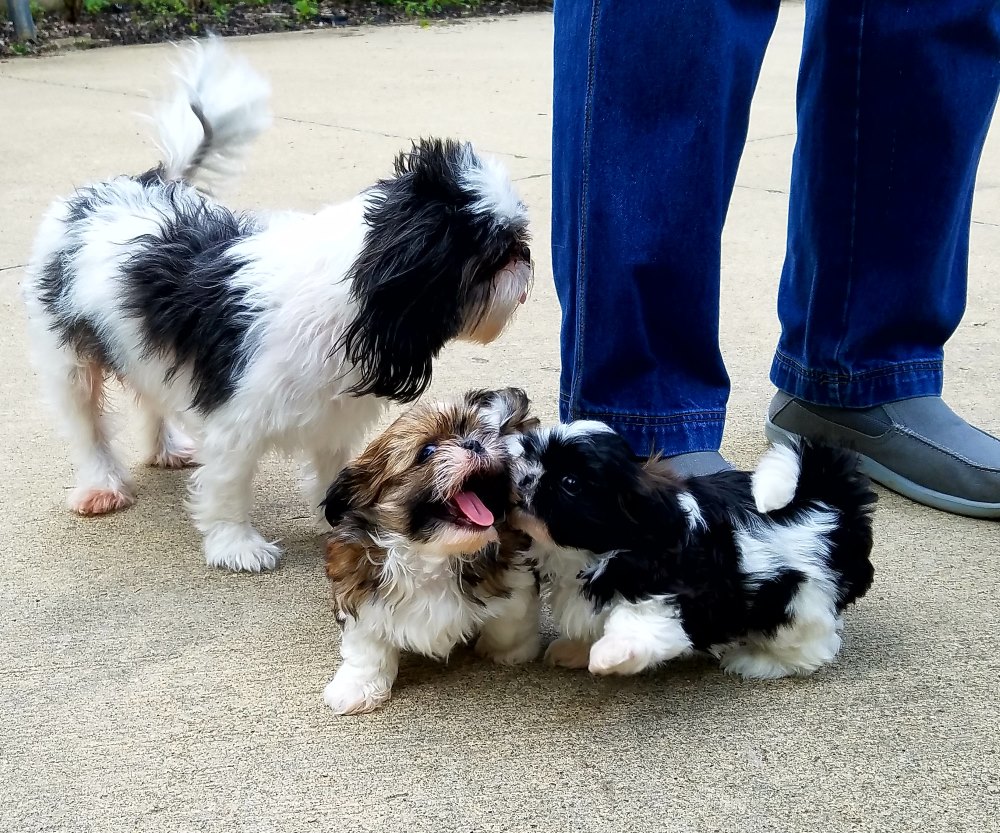 Puppy Mouthing begins when interacting with litter mates
Puppy Mouthing begins when interacting with litter matesConsider each play session with your new puppy to be an opportunity to teach social skills as they pertain to puppy mouthing. Any play experience can present a "teachable moment" so to speak. Assume that some play sessions might get a little out of hand and have a soft toy and a hard chew toy handy. When playing with your puppy, encourage playful behavior but stop the behavior immediately if the puppy begins to mouth/bite on your hand. Here are a few suggestions that help stop the behavior and teach the appropriate social skills.
Play and Stop: Initial Puppy Mouthing Training
- Play with the puppy. If she begins to mouth you or try to bite, Stop immediately and hide your hand behind your back. If she continues to try and find your hands, turn your back to the puppy which will indicate to her that play has ended. You can also replicate what another puppy might do in a similar situation. Cry out, yelp or make a noise that would suggest you have been hurt. That loud but quick cry usually gets their attention immediately and they will stop.
- Wait until she calms down a few seconds to 15 seconds and then begin the play session.
- If she continues to bite at you, offer a hard chew toy or soft toy for her to mouth.
- If she accepts the toy instead of your hand, praise her and continue the play session.
Play and Stop, Advanced Training for Puppy Mouthing
You may need to repeat the same routine as described above for several times until she finally gets the idea that human hands are not dog toys. Most puppies will get the idea and gradually refrain from biting human hands. Some puppies are more persistent and may need additional lessons.
If your puppy just doesn't seem to make the connection, you should still try and play the games but stop the game action for longer periods of time. For example, here is a step by step approach for puppies that need additional training.
- Play with the puppy. If she begins to mouth you or bite. stop and hold your hand behind your back while you turn away from the puppy. Instead of waiting a few seconds, hold this position for more than 15 seconds.
- You may also want to make a crying sound, yelp or loud, "ouch" which should get her attention immoderately.
- Wait for her to stop playing and calm herself. If she does calm down, praise her and continue the play. If she does not calm down but continues to jump and try to get to your hand. Stop, get up and stop the play altogether. Wait about a minute or more. The time interval will confuse her and also give her time to absorb the lesson.
The Lesson You are Trying to Teach
The lesson: I have fun playing with my human as long as I don't bite him. If I bite, then I no longer get to play. Therefore, if I want to play, I can't bite.
Do You Have a Puppy with a Gentle Mouth?
Some puppies learn the lesson that other dogs enjoy playing with dogs that have a gentle mouth. By this I mean that the puppy has learned to use her mouth to play without trying to bite. Some dog breeds are much better at learning this behavior.
Consider the retriever type breeds who retrieve prey such as birds or fish without tearing the prey apart. Their gentle mouth allows them to hunt and retrieve the game without damaging it to their owner. All breed can learn to mouth gently to other dogs and humans without the need to bite down and hurt. Shih Tzu like other small breeds enjoy playing with soft toys that they enjoy carrying in their mouth. This behavior is also the way you want them to respond to your hands.
Consistency is the key with all members of the family on the same page. Within a few months, most puppies "just get" the lesson, and are reliable as far as not nipping or biting.
Usually around 4 months old a puppy should have stopped mouthing people. However, what happens if he continues past his four-month-old birthday?
Stop Puppy Mouthing in an Older Puppy
Once your puppy gets close his five-month mark, the consequences need to be more obvious.
Continuing to allow an older puppy from mouthing can lead to adult behaviors that are harder to correct and the last thing you want is for an adorable puppy to turn into a biting adult dog.
This mouthing habit could become a well-established way of getting your attention. Is this what you want? If not, you will want to review the steps offered in this article for younger puppies and start your training again.
The main difference between training a 9 week old puppy and a six-month old puppy is the length of time you refrain from playing. You may be able to make a 9-week-old understand that mouthing, nipping or biting is not going to be tolerated by refraining from playing for a minute or more. You will want to do the following:
1. Make a loud yelp, cry or "ouch sound" to get her attention.
2. Give her a toy to chew on as a substitute for your hand.
3. Refrain from playing with her for up to a minute depending on how long it takes her to calm down, regroup and understand what you are doing.
Puppy Mouthing, Nipping, and Biting in Six Month Old Puppies
At this age, you want to assure that you are getting the behavior under control. At six months, your puppy may still be teething so take that into consideration, but to recap the steps you should take, here is a review.
1. Stop the play, Cry out with a yelp, cry of pain, or just plain "ouch" Whatever sound/word gets her attention.
2. Remove your hand and place behind your back.
3. If placing your hand behind your back does not get her attention, turn 45 to 90 degrees or until your back is to your puppy.
4. Remain there until the puppy gets the message that nipping/biting will cause the play to end. Then,
5. Give your puppy a chew toy or soft dog toy to mouth/chew on as a substitute for your hand.
Takeaway for Puppy Mouthing
Puppy mouthing is just one of the many behaviors that are typical and expected, even cute and tolerated in an eight week old. If you do not know how to curb some of these behaviors, however, all that cuteness can disappear quickly as the puppy grows.
"Hi, I'm Janice Jones, a former veterinary technician and Shih Tzu expert with over 40 years of experience with the breed. Through Miracle Shih Tzu, I combine my medical background and extensive breed knowledge to provide reliable, practical advice for Shih Tzu owners. My mission is to help you give your Shih Tzu the happiest, healthiest life possible through evidence-based information and real-world solutions. Whether you're new to the breed or a seasoned owner, you'll find trusted guidance here for all aspects of Shih Tzu care.
I hold an undergraduate degree in Psychology with a minor in biology, Early Childhood Education, and Nursing, and a Master's in Mental Health Counseling.
